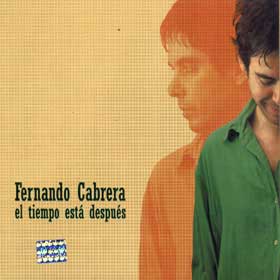
"El Tiempo Está Después" Was Issued In 2004. It Covers Fernando Cabrera's Very First Years As A Solo Artist.
The first Uruguayan album I purchased was this compilation by Fernando Cabrera, and it only makes sense he is the one artist I have chosen to inaugurate this section of MusicKO with.
Born in 1956 in Montevideo, he is one of the most respected composers in the whole country. He performs what we call “Música popular”, a category that is comparable with folk music in English-speaking countries to a considerable extent. His primary instrument is the guitar, and his MO on the whole is not that removed from artists I adore like Elvis Costello, XTC and Richard Thompson in the sense that he is a very distinguished lyricist whose vocal delivery is anything but mainstream, and while that costs him some wider appeal it gives him a certain exclusiveness that make him all the more beloved by his followers.
This compilation was first issued in the year 2004, and it gathers together the best cuts from his first three solo recordings (he had been part of the groups “MonTRESvideo” and “Baldío” during the late 70s and early 80s). These albums are “Autoblues” (1985), “Buzos Azules” (1986) and “El Tiempo Está Después” (1989).
Fourteen tracks are featured. Some are very short, like the opening “Iluminada” [Illuminated] and the set closer “No Te Olvidés” [Don’t You Forget], some rock quite energetically like “Tangente” [Tangent] and “Agua” [Water], and some have a lovely River Plate sensibility such as “La Garra Del Corazón” [The Drive Of The Heart] and “Los Viajantes” [The Travelers], with “La Garra Del Corazón” being actually a tango. But every single composition could be described as (to quote Bobby Darin) true poetry in motion. That is particularly true when it comes to the track that lends its title to the album, which in English is rendered as “Time Comes Afterwards” and the phenomenal “Imposibles” [Impossible Things] and “Pandemonios” [Pandemoniums].
Besides, there is a nod to the one Uruguayan writer that was the recipient of a Cervantes Award for his literary output, Juan Carlos Onetti, as the title of the song “El Posible López” pays homage to the short story “El Posible Baldi”.
I can honestly say this disc was the best first Uruguayan album I could have bought. I can’t help but think about how representative it is of these small aspects that define the country where I live and its people, without ever stooping to “artistic” gestures that have led to bigger worldwide exposure to other Uruguayan artists. No need at all to name them. Everybody knows who they are. Incidentally, I have to go shopping in a couple of minutes because I forgot to buy mayonnaise.
In that sense, the compilation is an outright triumph. An excellent introduction to music that definitely deserves to be listened to by more than 3,000,000 people.
Fernando Cabrera doesn’t seem to have an official website. There is an unofficial one here, but it seems not to have been updated in quite some time. But you can always catch up with him on MySpace – here you have the link.
